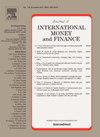Geopolitical risk and U.S. foreign portfolio investment: A tale of advanced and emerging markets
IF 3.3
2区 经济学
Q2 BUSINESS, FINANCE
引用次数: 0
Abstract
We study how U.S. portfolio investors react to the geopolitical risk in destination countries. First, we uncover significant heterogeneity between advanced and emerging market destinations: U.S. investment in foreign bonds and equities decreases only in response to heightened geopolitical risk in emerging markets, not in advanced markets. Second, we identify poor institutional quality and, to a lesser extent, closed capital markets in emerging market economies as the primary driver behind the larger sensitivity of portfolio investment to geopolitical risk. Third, we find a contagion effect that U.S. portfolio investment declines significantly in response to the heightened geopolitical risk in nearby countries even after controlling for the risk in the destination country. This contagion effect is confined to emerging markets, further highlighting the difference between advanced and emerging markets.
地缘政治风险与美国海外证券投资:发达市场与新兴市场的故事
我们研究了美国投资组合投资者对目的地国地缘政治风险的反应。首先,我们发现发达市场和新兴市场目的地之间存在显著的异质性:美国对外国债券和股票的投资仅在新兴市场地缘政治风险加剧时才会减少,而在发达市场则不会。其次,我们认为,新兴市场经济体较差的制度质量,以及较小程度上封闭的资本市场,是证券投资对地缘政治风险更敏感背后的主要驱动因素。第三,我们发现了传染效应,即使在控制了目的地国的风险后,美国证券投资也会因周边国家地缘政治风险的加剧而显著下降。这种传染效应仅限于新兴市场,进一步凸显了发达市场与新兴市场之间的差异。
本文章由计算机程序翻译,如有差异,请以英文原文为准。
求助全文
约1分钟内获得全文
求助全文
来源期刊

Journal of International Money and Finance
BUSINESS, FINANCE-
CiteScore
4.20
自引率
4.00%
发文量
141
期刊介绍:
Since its launch in 1982, Journal of International Money and Finance has built up a solid reputation as a high quality scholarly journal devoted to theoretical and empirical research in the fields of international monetary economics, international finance, and the rapidly developing overlap area between the two. Researchers in these areas, and financial market professionals too, pay attention to the articles that the journal publishes. Authors published in the journal are in the forefront of scholarly research on exchange rate behaviour, foreign exchange options, international capital markets, international monetary and fiscal policy, international transmission and related questions.
 求助内容:
求助内容: 应助结果提醒方式:
应助结果提醒方式:


